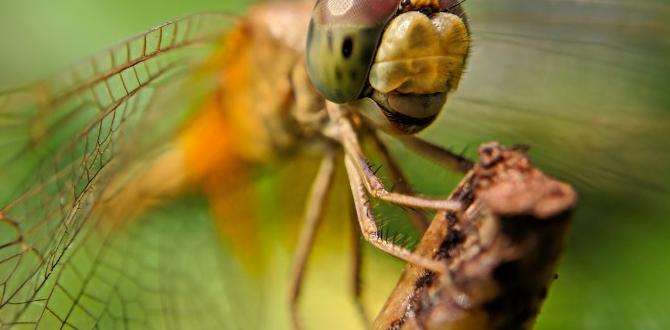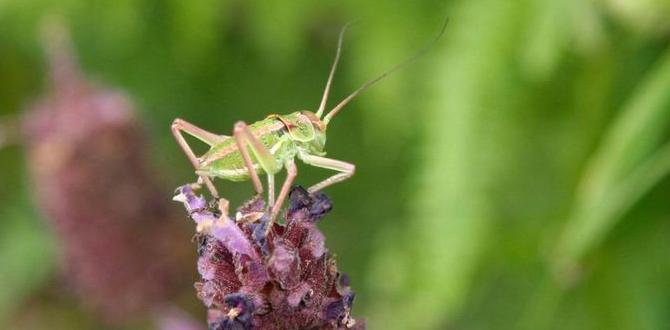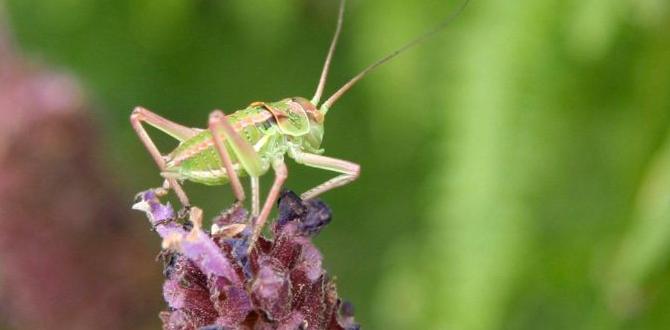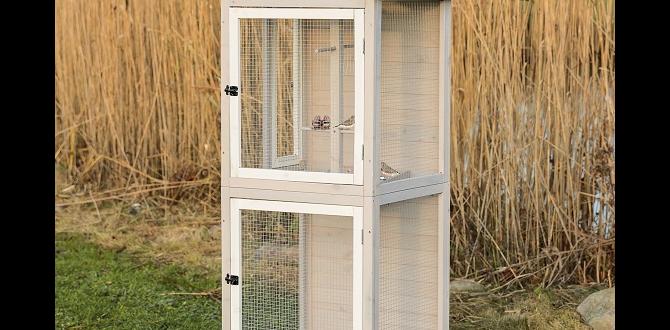Are Grasshoppers Good For Gardens? Discover Their Benefits! Grasshoppers, Often Seen As Mere Pests In The Garden, Spark Debates Among Gardeners About Their Role In The Ecosystem. While Many View Them As A Threat To Crops, There’S A Growing Understanding Of Their Potential Benefits. In This Article, We’Ll Explore Whether Grasshoppers Are Good For Gardens, Examining Both The Pros And Cons, And Shedding Light On Their Impact On Plant Health, Soil Quality, And Biodiversity. The Role Of Grasshoppers In Gardens Grasshoppers Are Herbivores, Primarily Feeding On Grasses And Leaves. However, Their Presence Can Be A Double-Edged Sword. On One Hand, They Can Help Control Plant Overgrowth, While On The Other, They Can Decimate Young Plants If Their Populations Explode. Benefits Of Grasshoppers For Gardens 1. **Natural Pest Control**: Grasshoppers Attract Predators Like Birds And Beneficial Insects That Can Assist In Keeping Other Pests At Bay. 2. **Soil Aeration**: As They Move Through The Soil And Plant Debris, Grasshoppers Can Help With Soil Aeration, Which Benefits Root Systems And Water Absorption. 3. **Biodiversity Boost**: Grasshoppers Are A Food Source For Various Wildlife, Contributing To A Balanced Ecosystem In The Garden. Downsides Of Grasshoppers In Gardens 1. **Crop Damage**: When Grasshopper Populations Surge, They Can Cause Significant Damage To Young Plants And Crops, Leading To Reduced Yields. 2. **Competition For Resources**: Grasshoppers Can Compete For Nutrients And Water, Particularly In Smaller Gardens Where Resources Are Limited. Finding Balance: How To Manage Grasshoppers 1. **Encourage Natural Predators**: Attract Birds And Beneficial Insects To Your Garden To Help Keep Grasshopper Populations In Check. 2. **Monitor Populations**: Keep An Eye On The Number Of Grasshoppers And Take Action If Their Numbers Begin To Threaten Your Plants. 3. **Create Habitats**: Planting A Diverse Range Of Plants Can Provide Refuge For Beneficial Species While Also Serving To Distract Grasshoppers From Your Most Vulnerable Crops. Conclusion So, Are Grasshoppers Good For Gardens? The Answer Isn’T Straightforward. While They Can Pose Challenges, Their Benefits To The Ecosystem And Garden Health Are Notable. By Adopting Strategies To Manage Their Populations, Gardeners Can Enjoy The Advantages Grasshoppers Bring While Minimizing Any Potential Harm To Their Plants. Understanding Their Role Can Lead To A More Harmonious Relationship Between These Insects And Your Garden.

Are Grasshoppers Good for Gardens?
Grasshoppers can be beneficial for gardens. They help with pollination, which means they can boost plant growth. Did you know they also help break down organic matter? This process enriches the soil. However, too many grasshoppers might munch on your plants. So, keeping their population in check is key. Imagine a garden buzzing with life; grasshoppers can contribute to that harmony. Explore how they help while also managing their numbers for a thriving garden!Understanding Grasshoppers in the Garden Ecosystem
Role of grasshoppers in the ecosystem. Types of grasshoppers commonly found in gardens.Grasshoppers play an important role in the garden ecosystem. They munch on grass and plants, keeping things tidy. This helps create space for other plants to grow. Normally, you’ll spot types like the American grasshopper and the Meadow grasshopper in gardens. These little guys can be friends or foes. They can help with pollination but might feast on your veggies if they’re hungry enough!
| Grasshopper Type | Characteristics |
|---|---|
| American Grasshopper | Large, green, loves to eat grass |
| Meadow Grasshopper | Small, camouflaged, blends well |
So, while they can be helpful, keep an eye on them! At least they don’t bring popcorn like at the movies!
Benefits of Grasshoppers in Your Garden
Natural pest control mechanisms. Contributions to soil health and aeration.
Grasshoppers are not just tiny jumpers; they can actually help your garden! First, these little critters are natural pest control agents. They munch on pesky bugs that can harm your plants. Funny, right? It’s like they see themselves as tiny superheroes! They also contribute to soil health. Their movements loosen the soil, allowing air and water to flow better. This creates a happy, healthy home for your plants. Who knew grasshoppers could be so helpful and entertaining?
| Benefit | Description |
|---|---|
| Pest Control | Grasshoppers eat smaller pests, reducing the need for chemicals. |
| Soil Aeration | They create air pockets in the soil as they hop around. |
Potential Risks of Grasshoppers in Gardens
Overpopulation and crop damage. Comparison with other garden pests.
Grasshoppers can harm gardens greatly. Too many grasshoppers may lead to overpopulation. This can cause them to eat lots of your plants. Crops can suffer serious damage. Compared to other pests, grasshoppers are often worse. While bugs like aphids suck on plants, grasshoppers chew them up. Even a few grasshoppers can create big challenges for garden health. Keep an eye on these pests to protect your green space.
What are the comparison points between grasshoppers and other garden pests?
Grasshoppers often destroy plants more than many other pests. Here’s a quick look at how they compare:
- Grasshoppers chew leaves and stems.
- Aphids suck sap, which can weaken plants.
- Caterpillars may cause damage but are often fewer in number.
How to Manage Grasshopper Populations
Effective organic control methods. Timing and monitoring strategies.Managing grasshopper populations can help keep your garden healthy. Use natural methods for control. Here are some effective strategies:
- Introduce natural predators, like birds and certain insects, to keep grasshoppers in check.
- Plant barrier crops to distract grasshoppers away from your main plants.
- Maintain garden cleanliness by removing debris where grasshoppers might hide.
Timing is also important. Monitor your garden regularly, especially in spring. Grasshoppers hatch then and can quickly multiply. An early check helps you act before they become a problem.
How can I keep grasshopper numbers low?
Planting flowers that attract grasshopper predators can help lower their numbers. You can also use homemade sprays with soap and water.
Attracting Beneficial Insects Alongside Grasshoppers
Companion planting techniques. Creating a balanced ecosystem in your garden.
Companion planting can help your garden thrive. By pairing grasshoppers with other plants, you invite friendly insects to join the party. These tiny heroes, like ladybugs, munch on pests that harm your plants. It’s like having a garden bouncer! A balanced ecosystem keeps things running smoothly and makes your flowers and veggies happier. Who wouldn’t want a garden that attracts good guys while keeping the bad guys away? Below is a table showing some great companion plants:
| Plant | Companion |
|---|---|
| Tomatoes | Basil |
| Carrots | Onions |
| Cucumbers | Radishes |
Planting these together creates a magical garden team. So, let’s grow those plants and watch the fun unfold!
Case Studies: Grasshopper Impact on Different Types of Gardens
Vegetable gardens vs. ornamental gardens. Success stories and lessons learned from experienced gardeners.
Grasshoppers can be identical twins in the garden world, with one side helping and the other causing trouble. In vegetable gardens, they can munch on your crops like a kid at a candy store, but sometimes they help control pests. In ornamental gardens, they can add a fun buzz but may snack on your flowers. Experienced gardeners share tales of success and learning through these little green buddies. A few have even declared, “Less grass, more happiness!”
| Garden Type | Grasshopper Impact | Gardener’s Note |
|---|---|---|
| Vegetable | Many munch, but can help | Plant decoys! |
| Ornamental | They love flowers, too | Spray with kindness! |
Conclusion
In conclusion, grasshoppers can be good for gardens. They help by breaking down plant material and feeding birds. However, too many can damage your plants. To keep your garden healthy, monitor grasshopper populations. If you want to learn more, explore ways to attract beneficial insects. You’ll create a happy, balanced garden!FAQs
How Do Grasshoppers Impact The Overall Health Of A Garden Ecosystem?Grasshoppers can help a garden by eating plants and keeping them from growing too tall. This gives other plants space to grow and stay healthy. However, if there are too many grasshoppers, they might eat too many leaves and hurt the plants. So, grasshoppers are important but need to be balanced in the garden.
What Benefits Do Grasshoppers Provide To Garden Plants, If Any?Grasshoppers can help garden plants by spreading seeds. When they eat seeds or plants, they leave behind parts that can grow into new plants. They also help break down the soil as they dig around. This makes it easier for plants to grow. Plus, they are food for birds and other animals, which helps keep nature balanced.
Are There Specific Garden Plants That Are More Susceptible To Damage From Grasshoppers?Yes, some garden plants are more likely to get hurt by grasshoppers. They really like yummy leaves and tender stems. Plants like lettuce, beans, and young flowers can get eaten a lot. If you have these plants, keep an eye on them! You might need to protect them from grasshoppers.
How Can Gardeners Manage Grasshopper Populations Without Harming Beneficial Insects?You can manage grasshopper populations by planting flowers that attract helpful bugs. These good bugs eat grasshoppers or keep them away. You can also use barriers like row covers to protect your plants. If you need to use sprays, choose ones labeled safe for other insects. Always read the label before using anything.
What Natural Predators Can Help Control Grasshopper Populations In A Garden?We can use natural predators to help control grasshopper populations in our gardens. Birds, like purple martins and sparrows, love to eat grasshoppers. Frogs and toads also enjoy munching on them. Some small insects, like spiders, will catch grasshoppers too. By encouraging these animals, we can keep grasshoppers from ruining our plants!







